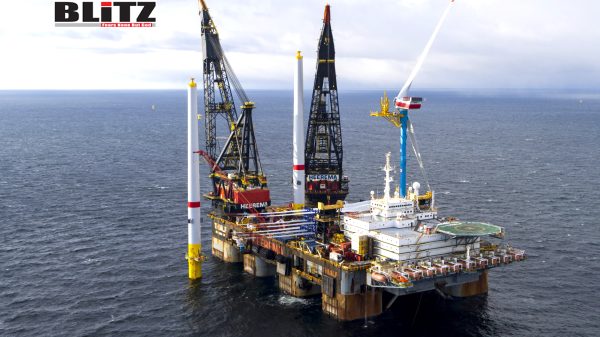German officials oppose Polish Baltic Sea oil drilling plans over environmental concerns
- Update Time : Thursday, July 24, 2025

The discovery of a vast oil and gas deposit off the Polish coast in the Baltic Sea has sparked significant controversy, with German officials and environmental groups voicing strong opposition to Poland’s plans to develop the hydrocarbon field. The dispute centers on concerns that exploiting the Wolin East deposit, situated near the German-Polish border, could cause serious environmental damage and disrupt the tourism-dependent economies on both sides.
On July 21, Canadian company Central European Petroleum (CEP) announced the discovery of the Wolin East hydrocarbon deposit, located approximately 6 kilometers off the port city of Świnoujście, on the Polish coast adjacent to the German border. CEP, which has held exploration rights in the region since 2017, heralded this find as Poland’s largest hydrocarbon discovery in decades and one of the biggest in Europe over the last ten years.
The company estimates that the Wolin East deposit contains recoverable reserves of more than 33 million tons of oil and 27 billion cubic meters of natural gas. It projects a production potential exceeding 400 million barrels of oil equivalent. If fully exploited, the deposit could provide Poland with a meaningful boost in energy security, potentially covering 4 to 5 percent of its annual oil demand.
The Polish government views the discovery as a strategic breakthrough. Undersecretary of State and Chief Geologist Krzysztof Gałos stated that commercial production could begin within 3 to 4 years, pending regulatory approvals and permits. The project is framed as a key step toward reducing Poland’s energy reliance on imports, especially amid ongoing efforts by the European Union to wean itself off Russian energy sources in the wake of sanctions related to the war in Ukraine.
However, the discovery has not been welcomed across the border. German officials, environmentalists, and local communities have expressed alarm about the potential repercussions of drilling activities so close to Germany’s coastline and the shared island of Usedom-known in Poland as Wolin.
The island, divided by the German-Polish border, is famed for its natural beauty, pristine beaches, and popular holiday resorts that attract tourists from across Europe. Local economies on both sides rely heavily on tourism, which officials fear could be jeopardized by industrial oil and gas operations.
Mecklenburg-Western Pomerania’s Environment Minister Till Backhaus was among the first German officials to speak out. He criticized Poland for proceeding with exploration and development plans without adequately informing Germany, alleging a breach of cross-border environmental agreements. “The plans run counter to the environmental and tourism interests of the German side,” Backhaus warned, underscoring concerns about the potential for transboundary environmental impacts.
The key worries center on the effects of noise and vibrations from drilling and extraction processes, which can disturb marine life and seabed habitats. There is apprehension that the fragile Baltic Sea ecosystem, already vulnerable due to pollution and overfishing, could suffer irreversible damage. Marine flora and fauna, including fish populations vital to local fishing industries, may be adversely affected.
Heringsdorf mayor Laura Isabelle Marisken, representing one of the prominent German resort towns on Usedom, voiced frustration and called for clarity and intervention. “This is not a place for industrial-political poker games,” she said, emphasizing that the tourism sector depends on the natural environment remaining intact.
Adding to the pressure, German environmental group Lebensraum Vorpommern has condemned the Polish project in stark terms. The organization accused Poland of “destroying the nature-protected Wolin Baltic Sea coast” and warned of an impending “environmental catastrophe.” It has announced plans to sue the Polish government in an attempt to halt or delay the extraction activities.
Such legal action would likely focus on environmental regulations at both the national and EU levels. The Baltic Sea region is covered by various international agreements aimed at protecting its marine environment, including transboundary cooperation mechanisms. Critics argue that Poland’s failure to engage in proper consultations violates these protocols.
Despite mounting opposition, there has been no official reaction yet from the German federal government in Berlin. The absence of a clear federal stance leaves the issue in a state of uncertainty, even as local authorities and environmentalists ramp up their objections.
The dispute over the Wolin East deposit cannot be divorced from the broader geopolitical context. The European Union is undergoing a significant energy transition, partly accelerated by the war in Ukraine and resulting sanctions imposed on Russia. The EU’s efforts to reduce dependence on Russian oil and gas have created urgency for alternative energy sources.
Poland has been particularly keen on diversifying its energy mix and enhancing domestic production to bolster security and reduce exposure to geopolitical pressures. The discovery of a major hydrocarbon deposit in the Baltic Sea offers a potentially strategic advantage in this context.
Conversely, Germany faces its own challenges in balancing energy security with environmental and economic interests. While Germany has not yet taken a formal position, it is clear that local concerns, especially from the state of Mecklenburg-Western Pomerania, carry significant weight. Tourism along the Baltic coast is a vital economic driver, and there is widespread public sensitivity to environmental preservation.
The controversy underscores the enduring tension between economic development ambitions and environmental protection, especially in sensitive regions where multiple nations share resources and ecosystems.
Proponents of the Polish drilling project argue that strict environmental standards and modern technologies can mitigate risks. They stress the importance of enhancing energy independence amid a volatile geopolitical environment. Meanwhile, critics highlight the potentially irreversible damage to natural habitats and the livelihoods of coastal communities, which rely on tourism and sustainable fishing.
The coming months will likely see increased diplomatic exchanges between Poland and Germany as the project advances through regulatory channels. Whether Berlin will escalate the issue at the federal level or seek to negotiate safeguards remains to be seen.
The case also highlights the broader challenges faced by the EU in coordinating cross-border environmental governance while meeting energy demands during a period of geopolitical upheaval.
For now, the future of the Wolin East deposit hangs in a delicate balance-caught between Poland’s pursuit of energy security and Germany’s efforts to protect its coastal environment and tourism economy. How the two neighbors navigate this dispute will be a test of regional cooperation in an increasingly complex energy landscape.










